
The Hostage Rescue Team (HRT) is the Federal Bureau of Investigation's (FBI) elite tactical unit. The HRT was formed to provide a full-time federal law enforcement tactical capability to respond to major terrorist incidents throughout the United States. Today, the HRT performs a number of tactical law enforcement and national security functions in high-risk environments and conditions and has deployed overseas, including with military Joint Special Operations Command units.

The Federal Security Service of the Russian Federation is the principal security agency of Russia and the main successor agency to the Soviet Union's KGB; its immediate predecessor was the Federal Counterintelligence Service (FSK) which was reorganized into the FSB in 1995. The three major structural successor components of the former KGB that remain administratively independent of the FSB are the Foreign Intelligence Service (SVR), the Federal Protective Service (FSO), and the Main Directorate of Special Programs of the President of the Russian Federation (GUSP).
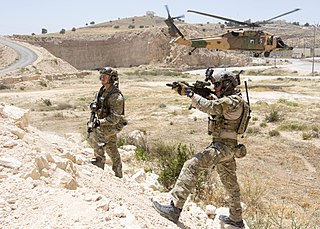
Special operations or special ops are military activities conducted, according to NATO, by "specially designated, organized, selected, trained, and equipped forces using unconventional techniques and modes of employment." Special operations may include reconnaissance, unconventional warfare, and counterterrorism, and are typically conducted by small groups of highly trained personnel, emphasizing sufficiency, stealth, speed, and tactical coordination, commonly known as special forces.

The Inter-Services Intelligence is the largest and best-known component of the Pakistani intelligence community. It is responsible for gathering, processing, and analyzing any information from around the world that is deemed relevant to Pakistan's national security. The ISI reports to its director-general and is primarily focused on providing intelligence to the Pakistani government.

Charles E. Allen is an American public servant, notable for his roles at the United States Department of Homeland Security's Office of Intelligence and Analysis and, before that, the Central Intelligence Agency.
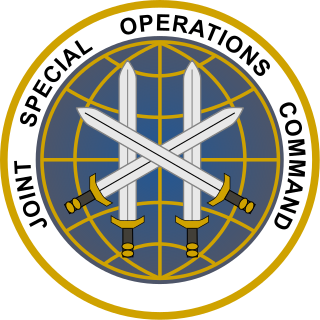
The Joint Special Operations Command (JSOC) is a joint component command of the United States Special Operations Command (USSOCOM) and is charged with studying special operations requirements and techniques to ensure interoperability and equipment standardization, to plan and conduct special operations exercises and training, to develop joint special operations tactics, and to execute special operations missions worldwide. It was established in 1980 on recommendation of Colonel Charlie Beckwith, in the aftermath of the failure of Operation Eagle Claw. It is headquartered at Pope Field.

The National Directorate of Security was the national intelligence and security service of the Islamic Republic of Afghanistan. The headquarters of the NDS was in Kabul, and it had field offices and training facilities in all 34 provinces of Afghanistan. The NDS was part of the Afghan National Security Forces (ANSF).
The term Special Missions Unit (SMU), at one time referred to as a "Tier 1" unit, is used in the United States to categorize the nation's most highly secretive and elite military special operations forces. The term "special missions unit" is also used in Australia to describe the Special Air Service Regiment. Special mission units have been involved in high-profile military operations, such as the killing of Osama bin Laden and the attempted hostage rescue of Kayla Mueller.

Malcolm Wrightson Nance is an American author and media pundit. He is a former United States Navy Senior Chief Petty Officer specializing in naval cryptology.

Michael George Vickers is an American defense official who served as the Under Secretary of Defense for Intelligence (USD-I). As USD-I, Vickers, who was appointed by President Barack Obama in 2010, was the Defense Department's top civilian military intelligence official. Before becoming USD-I, Vickers served as Assistant Secretary of Defense for Special Operations and Low Intensity Conflict.
The Assistant Secretary of Defense for Special Operations/Low-Intensity Conflict or ASD(SO/LIC), is the principal civilian advisor to the U.S. Secretary of Defense on special operations and low-intensity conflict matters. Located within the Office of the Under Secretary of Defense for Policy, the ASD(SO/LIC) is responsible primarily for the overall supervision of special operations and low-intensity conflict activities. These activities, according to USSOCOM's 2007 Posture Statement, include counterterrorism; unconventional warfare; direct action; special reconnaissance; foreign internal defense; civil affairs, information operations, psychological operations, and counterproliferation of WMD.

James Wright Foley was an American journalist and video reporter. While working as a freelance war correspondent during the Syrian Civil War, he was abducted on November 22, 2012, in northwestern Syria. He was murdered by decapitation in August 2014 purportedly as a response to American airstrikes in Iraq, thus becoming the first American citizen killed by the Islamic State of Iraq and Syria (ISIS).
The 2014 rescue mission in Syria was an American led effort to locate and rescue hostages being held by Islamic State (IS) forces. Plans to rescue the hostages were accelerated after the execution of journalist James Foley, Steven Sotloff, and Kayla Mueller by IS militants. A total of 14 hostages were held hostage by the IS at an undisclosed location. Though no soldiers were killed, the mission failed to locate and rescue the hostages.
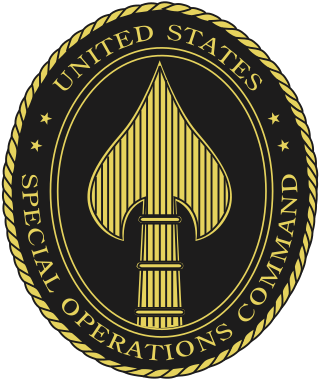
The United States Special Operations Command is the unified combatant command charged with overseeing the various special operations component commands of the Army, Marine Corps, Navy, and Air Force of the United States Armed Forces. The command is part of the Department of Defense and is the only unified combatant command created by an Act of Congress. USSOCOM is headquartered at MacDill Air Force Base in Tampa, Florida.
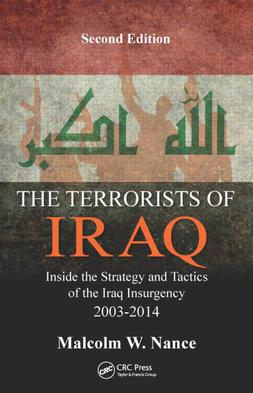
The Terrorists of Iraq: Inside the Strategy and Tactics of the Iraq Insurgency 2003–2014 is a nonfiction book about the Iraqi insurgency, written by U.S. Navy retired cryptology analyst Malcolm Nance. It was published by CRC Press in 2014. The book discusses the terrorist evolution of the Iraqi insurgency which led to the formation of Islamic State of Iraq and the Levant (ISIS). Nance cites the 2003 Iraq war by the Bush Administration for causing regional instability. He criticizes Coalition Provisional Authority leader Paul Bremer. The book emphasizes lessons the U.S. neglected to learn from the Vietnam War, the Iraqi revolt against the British, and the South Lebanon conflict. Nance writes in favor of the Iran nuclear deal framework by the Obama Administration, saying it is in the interests of all parties involved.

An End to al-Qaeda: Destroying Bin Laden's Jihad and Restoring America's Honor is a non-fiction book about counterterrorism strategies towards al-Qaeda, written by U.S. Navy retired cryptology analyst Malcolm Nance. The book describes how the September 11 attacks changed the traditional Muslim community around the globe. Nance criticizes the approach of the George W. Bush administration, including the verbiage and public presentations used in the War on Terror. The author argues al-Qaeda is not part of Islam but is instead a dangerous religious cult. Nance writes the United States should commit to better education with a public relations campaign to encourage traditional believers in Islam around the world to denounce al-Qaeda.

Terrorist Recognition Handbook: A Practitioner's Manual for Predicting and Identifying Terrorist Activities is a non-fiction book about counterterrorism strategies, written by U.S. Navy retired cryptology analyst Malcolm Nance. The book is intended to help law enforcement and intelligence officials with the professional practice of behavior analysis and criminal psychology of anticipating potential terrorists before they commit criminal acts. Nance draws from the field of traditional criminal analysis to posit that detecting domestic criminals is similar to determining which individuals are likely to commit acts of terrorism. The book provides resources for the law enforcement official including descriptions of devices used for possible bombs, a database of terrorist networks, and a list of references used. Nance gives the reader background on Al-Qaeda tactics, clandestine cell systems and sleeper agents, and terrorist communication methods.

Henry "Hank" A. Crumpton is a retired Central Intelligence Agency operations officer, in his 24 year career he was appointed deputy director of the Counterterrorism Center and head the CIA's National Resources Division, which focuses on operations in the United States. He played an instrumental role in the early days of the invasion of Afghanistan, leading CTC Special Operations paramilitary forces as some of the first people with boots on the ground in pursuit of the Taliban and al-Qaeda just weeks after 9/11. Gary Schroen's seven man Northern Alliance Liaison Team (NALT) forged alliances and established camp in the mountains, while Crumpton crafted a plan for a larger incursion alongside others like Greg Vogle and Chris Wood. He went on to be appointed by President George W. Bush as Coordinator for Counterterrorism at the Department of State with the rank of Ambassador-at-large on August 2, 2005. He is an author and co-founder, Chairman, and CEO of the business intelligence and political risk firm Crumpton Global LLC.
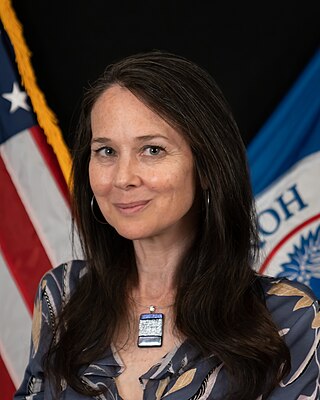
Jen Easterly is an American intelligence and former military official who is serving as the director of the Cybersecurity and Infrastructure Security Agency in the Biden administration. She was confirmed by a voice vote in the Senate on July 12, 2021.

Christopher Paul Maier is an American government official who is the Assistant Secretary of Defense for Special Operations and Low-Intensity Conflict. He previously served as the Principal Assistant Secretary of Defense for Special Operations and Low-Intensity Conflict.

















